Sleep Apnea Treatment - Houston, TX
The Relief You Need for Deep, Restful Sleep
Obstructive sleep apnea (OSA) is a disorder wherein the soft tissues in the mouth, such as the palate or tongue, block the airway during sleep. This causes a person to temporarily stop breathing at night, making it virtually impossible for them to get a sufficient amount of rest. OSA can contribute to a range of serious health problems, including weight gain, diabetes, and cardiovascular disease. In severe cases, it can even be fatal. The more apneas (periods of not breathing) that a person has each night, the more serious their condition is.
As your oral surgeons in Houston, we are deeply concerned about the prevalence of OSA and offer sleep apnea treatment for Houston, TX residents that may help you to reclaim the high-quality shuteye you deserve.
Symptoms of Sleep Apnea
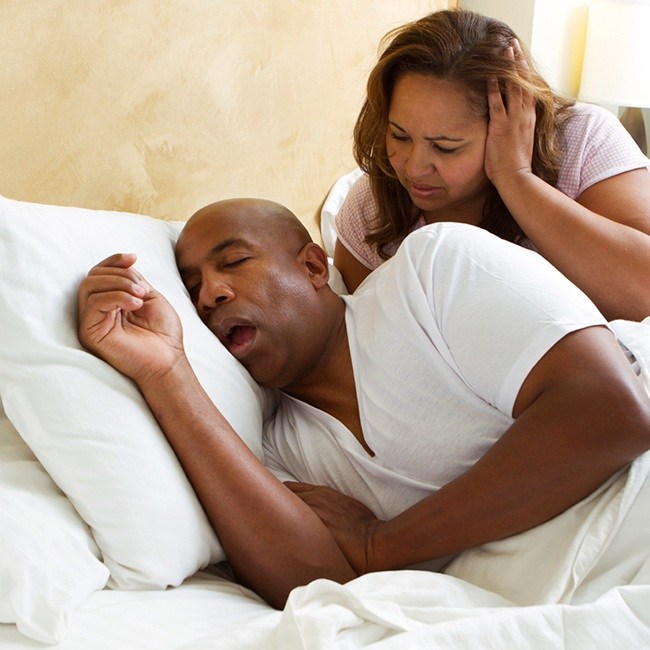
If your partner comments that you snore loudly or that you toss and turn a lot at night, these are major indicators that you may be suffering from obstructive sleep apnea. Other symptoms of this disorder include:
- Excessive daytime fatigue
- Trouble concentrating
- Slowed reaction times
- Mood swings and depression
- Waking up with a sore throat or headache
- Waking up gasping for air
- Frequent nighttime urination
- Decreased libido
Non-Surgical Treatments for Sleep Apnea
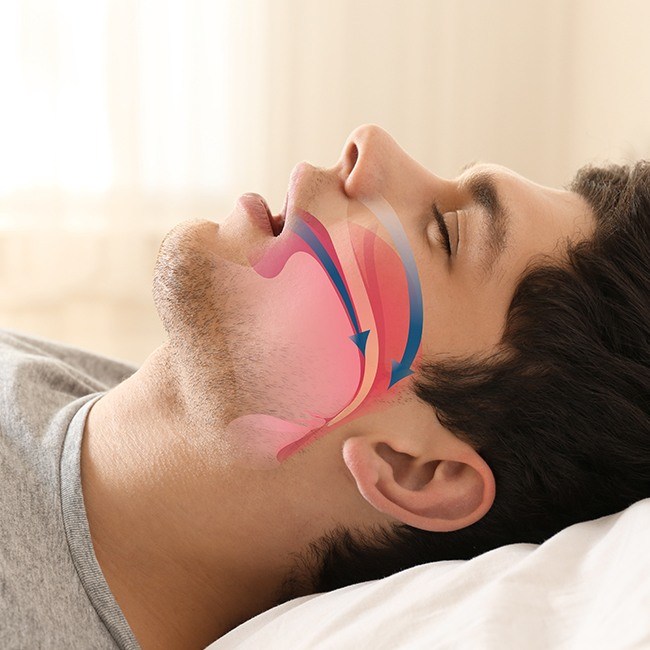
For mild cases of OSA, it may be possible to alleviate the condition through lifestyle changes. For example, since obesity can contribute to sleep apnea, simply losing some weight may provide relief. Other lifestyle changes that may help include not drinking alcohol before bedtime and quitting smoking.
If lifestyle changes are not enough to help you, you may need to visit your Houston oral surgeon for one of the following treatments:
Oral Appliance Therapy
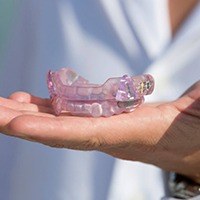
A custom-made dental appliance can reposition your jaw at night, thereby helping to keep the airway open, so you can breathe easily at night. These devices are small and extremely portable, and they often work well in cases of mild to moderate OSA.
CPAP/ Hybrid Therapy
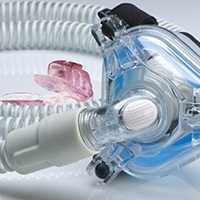
A continuous positive airway pressure (CPAP) machine can gently force air into your body while you sleep, preventing airway obstruction. However, some people find that the CPAP mask is uncomfortable or that it moves a lot during the night. Hybrid therapy, which uses a custom-made oral appliance that is attached to the CPAP machine, may offer a more comfortable and secure alternative.
Surgical Sleep Apnea Treatment
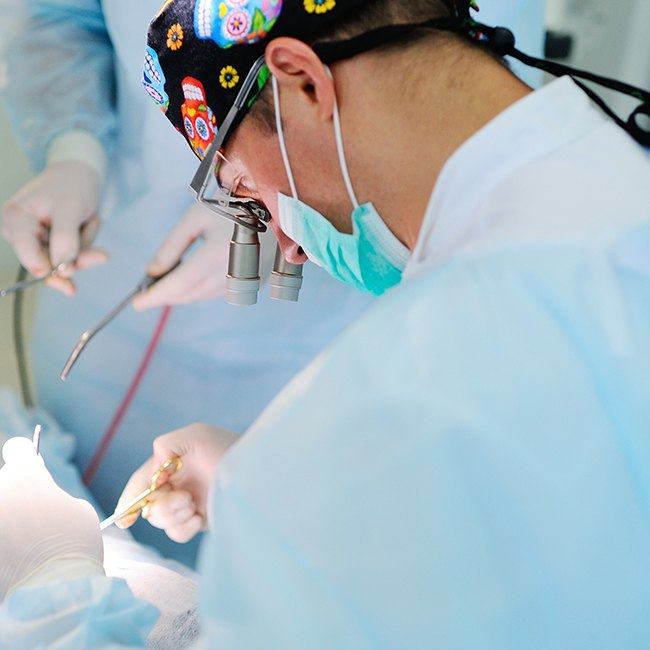
In cases of severe OSA, your oral surgeon in Houston may have to alter your oral structures in order to correct your disorder. For example, removing a small portion of the palate or the uvula (an extension of the soft palate) may allow more room for airflow while you are asleep. Another possible treatment, jaw advancement surgery, may be used to prevent your tongue from blocking your airway at night. After Drs. Koo and Weil, your Houston oral surgeons, examine your mouth and learn as much as they can about your sleep apnea, they will talk to you in detail about surgical options for addressing your problem.
Learn More about Surgery Treatment
Sleep Apnea FAQs
The team at Piney Point OMS in Houston would love to help you achieve better sleep. Before you visit us for a consultation, however, you might want to learn more about sleep apnea and how it can be addressed. Of course, our team will be happy to answer your questions when you call or visit us. In the meantime, you can find some useful information in this list of FAQs.
Does Everyone Who Snores Have Sleep Apnea?
Snoring occurs when air pushes past tissues in the airway, causing them to vibrate. In some cases, those same tissues completely block the airway, leading to pauses in breathing and episodes of reduced breathing. However, that does not mean that anyone who snores has sleep apnea.
If someone snores only occasionally, it is probably nothing to worry about. Loud, frequent snoring, on the other hand, may be a reason to ask your doctor about undergoing a sleep test.
It is also worth noting that some people with sleep apnea do not snore at all.
How Long Are Apnea Events or Episodes?
An apnea is a pause in breathing, whereas a hypopnea is an episode of reduced breathing. These episodes must last for 10 seconds or longer (sometimes up to 2 minutes) to register as an event during a sleep test. People who experience fewer than 5 episodes per hour are considered normal, healthy sleepers. More than 5 events per hour means a sleep apnea diagnosis. Some individuals with severe OSA experience around 30 episodes each hour.
Will My Sleep Apnea Go Away If I Lose Weight?
In some individuals, obstructive sleep apnea occurs because extra fatty tissue around the neck or abdomen is placing pressure on the airway, causing breathing problems during sleep. For such people, weight loss may lead to a reduction in symptoms. In fact, some people have completely eliminated their sleep apnea by losing weight.
Of course, weight loss is not a guarantee that you will sleep better. Some cases of OSA have nothing to do with an individual’s body weight or composition. That is why it is always important to seek professional care for any sleep disorder. Whether your condition is caused by your weight or other issues, a trained medical practitioner can design a treatment plan to help you start sleeping better as soon as possible.
Will I Need Surgery to Treat My Sleep Apnea?
In most cases, OSA can be addressed via conservative, non-invasive means. For some individuals, however, surgical intervention is the best way for them to find long-lasting relief. When you visit our team, we will evaluate your airway, learn about your symptoms, and recommend the treatment that we believe would be most effective for you.
Wisdom Teeth Extractions Oral & Maxillofacial Pathology Oral Cancer Orthognathic Surgery Dental Implants Pre-Prosthetic Surgery Facial Trauma Treatment Apicoectomy Surgery Cleft Lip & Palate Surgery TMJ Treatment Corrective Orthodontic Surgery Anesthesia & Sedation Dentistry Cosmetic Facial Treatments Dental Emergencies View Our Services

